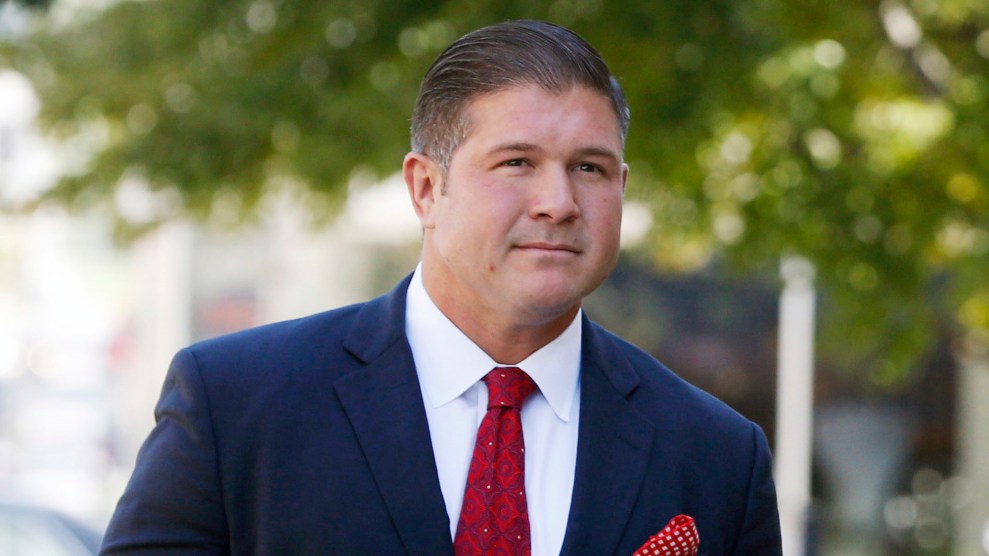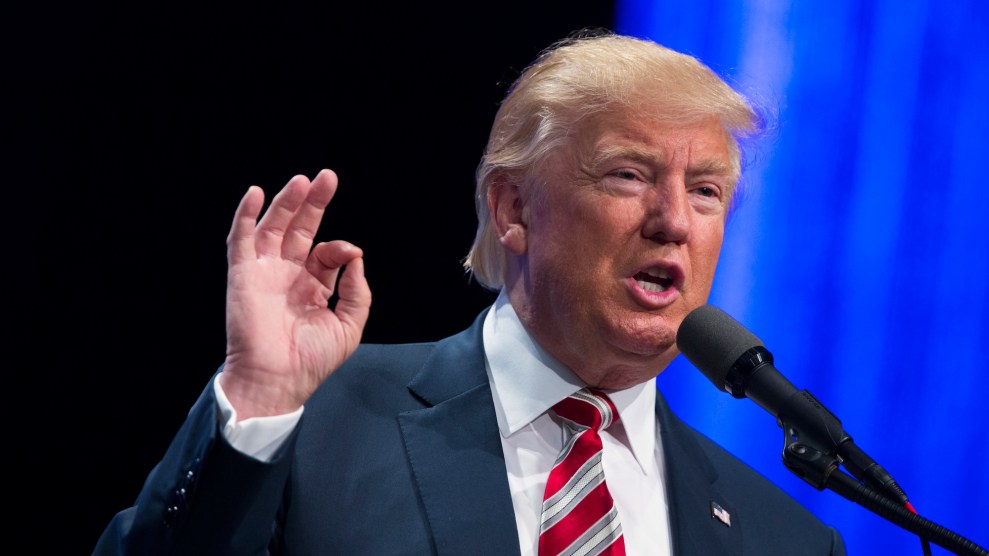
Jesse Benton arrives for sentencing in 2016.David Pitt/AP
On Friday, a federal judge in Washington, DC sentenced a veteran GOP operative to 18 months in prison for funneling $25,000 from a Russian businessman to Donald Trump’s 2016 campaign.
Jesse Benton, a longtime aide to both Ron and Rand Paul, was convicted in November on six related charges. The court found that he and another GOP operative accepted $100,000 from Roman Vasilenko, a St. Petersburg-based influencer who wanted photos with Trump to display on his social media accounts. Benton kept most of the money for himself but donated $25,000 to the Republican National Committee as part of a plan to secure two tickets to a fundraising event for Trump in Philadelphia. At the event, Vasilenko was allowed to sit close to Trump at a roundtable discussion and later took a photo with him. Foreign nationals, like Vasilenko, are not allowed to donate to US political campaigns or committees, and it is illegal to make a donation on behalf of someone else.
Benton, who is married to Ron Paul’s grandaughter, was previously convicted in 2016 of a scheme to pay an Iowa state senator to switch his endorsement from Michele Bachmann to Ron Paul ahead of the state’s 2012 republican presidential caucus. In that case, Benton, after pleading that he had reformed and had a family to support, was sentenced to home confinement. Just six days later, the Trump fundraiser at which Vasilenko met Trump took place. A few weeks after that, Benton was caught in an undercover sting orchestrated by the British newspaper The Telegraph, whose reporters posed as representatives of a Chinese businessman who wanted to donate $2 million to Trump’s campaign. Benton told them he could arrange it. He apparently violated the terms of his home confinement in the Iowa case to meet with the undercover reporters.
In a letter submitted to the judge before his sentencing this week, Benton said he had suffered enormously in the face of federal investigations over the last eight years, which he said had nearly bankrupted him and ruined his good name. Benton wrote that he currently delivers for DoorDash to make ends meet, and, in asking for more home confinement instead of prison time, argued that being separated from his family would be painful for them, including his young daughter. In pleading for leniency, Benton cited his Christianity and claimed he was no longer involved with politics. (In 2016, he had also pointed to his faith and claimed to be out of the business.)
At Benton’s sentencing hearing Friday, U.S. District Court judge Trevor McFadden, a Trump-appointee whose light sentences of January 6 defendants have been controversial, was not in the mood for Benton’s argument.
“Sir, I will tell you, frankly, it’s difficult for me to read your letter talking about your integrity and faith with this pattern of deception,” McFadden told Benton. “I cannot ignore you were engaging in this incident here while you were facing sentencing in another case for political conspiracy. The judge in that case gave you a real break, it’s shocking to me you would take that break and the mercy you sought from him and only six days later mail in this false contribution.”
At trial, Benton’s attorney Brian Stolarz attempted to argue his client had been given bad legal advice from another lawyer that making the donation was acceptable, but the jurors weren’t buying. At sentencing, Stolarz suggested that Benton’s actions didn’t indicate he was aiming to influence the Trump campaign on Vasilenko’s behalf: After Vasilenko gave Benton the $100,000, Benton stalled in donating any part of it. He eventually had to be pursued by the RNC—weeks after the event took place—to make the payment he had promised. Benton offered numerous excuses to the RNC, including that he had just dropped the check in the mail and that he would wire the money immediately. He also only ever paid $25,000, not the $50,000 that he and the other operative had originally agreed to donate on Vasilenko’s behalf. Benton kept the remaining $75,000 himself. (Doug Wead, who was originally named as a co-defendant with Benton, died in late 2021.)
Stolarz told McFadden that Benton was panicked about his legal troubles in the other case and was trying to keep the money. “The money was for him,” Stolarz said.
In court, McFadden was willing to entertain that notion. “One could think that the defendant had no intention of providing any money to the RNC, that he was actually fleecing the RNC and Mr. Vasilenko, or both,” McFadden said. “But he got pushed into a corner by the RNC repeatedly asking, ‘Where’s our money?'”
But ultimately, McFadden told Benton, he did do the crime and it did harm the integrity of the 2016 election. “I do believe your actions undermined the rule of law in this country,” McFadden said, adding that they had undermined the transparency of the Trump campaign and the broader electoral process.
Benton was ordered to report to prison on June 1. While Stolarz told McFadden that Benton would appeal, the judge ruled that he will not be allowed to stay free on bail through that process.













